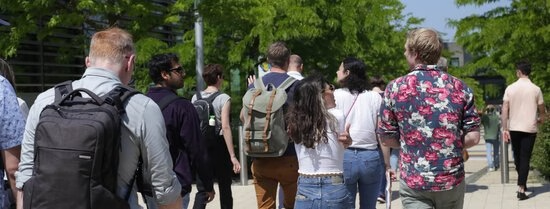This blog is a reflection on the workshop “The Holistic University”, hosted by Dr. Ana Vasques and Eva Rood during the DIT Day 2023. The workshop utilised the Inner Development Goals framework (IDG) to explore how the university of the future can support the ‘inner development’ of students.
Written by Anna Stepanyuk & Neel van Roessel
For context: The Inner Development Goals (IDG) framework provides an overview of transformative skills needed for sustainable development. These skills are organised according to five dimensions:
Being (Relationship to Self).
Thinking (Cognitive Skills).
Relating (Caring for Others and the World).
Collaborating (Social Skills).
Acting (Enabling Change).
It is vital for students to develop these skills, as they pave the way for leading purposeful, sustainable and productive lives. On a societal level, they are central to achieving the Sustainable Development Goals.

During the workshop, we walked around Woudestein campus to reflect on the IDG framework and its relevance for universities.
Guided by workshop hosts Ana Vasques and Eva Rood, we took stops to reflect on how the IDG framework could enable EUR to better support its students. Our first stop was in EUR’s edible garden. Here, we explored the IDG’s first dimension: Being. We walked around the edible garden focusing on our five senses and reflecting on our relationship to ourselves.
The next stop was at the Erasmus statue. Here, we were asked to ’Think’ about the interrelationship between different aspects of a product, for example for paper you need a tree, for a tree you need soil and water etc.
Then, we experienced ‘Relating’ while walking towards the Erasmus Sustainability Hub. In pairs, we discussed the constellation of the university, the people involved, and we practiced gratefulness.
On the fourth stop, we practiced ’Collaboration’ during a competitive exercise. Last, the final destination of the walk was inside, ’Act’, where we pondered the following question: what actions are required from the University of the Future to embrace Inner Development? In groups the participants came up with ideas and visions on how the IDGs could be implemented in the university of the future.
Lessons learnt: we need to slow down academic life and create space for contemplation, experimentation and honest conversation.
We concluded the workshop with a plenary discussion. Some of us expressed the need to slow down academic life and focus on the process of learning itself. For example, they stressed the importance of embracing failure for nurturing creativity in academia. Building on this idea, they suggested creating a safe environment, perhaps a living room, where students and teachers can freely test their ideas, experiment and fail. According to their vision, the testing itself should be the end goal, without the need to develop anything better.
Another suggestion was to create weekly meetings at the university, where everyone could share their experiences. Nowadays, if similar meetings are in place, they are often aimed at pitching an idea. Instead, they could be more conversational and accommodate open conversations. Also, they expressed the importance of getting out of one’s bubble to try to understand people with contrasting views. Interestingly, the participants said that study programmes must be suspended to accommodate contemplation and allow students and educators to focus on the learning and teaching processes, respectively.
To sum up, during the workshop, we learned to understand and apply the Inner Development Goals framework, and came up with new ideas about how academia could nurture a diversity of knowledge and competencies for thriving in the twenty-first century.
- CV
About the authors
Anna Stepanyuk is a MSc student of Global Business & Sustainability at the Erasmus University Rotterdam and an assistant at the DIT platform. Anna helps develop and execute communications and marketing strategies and provides organisational support for DIT's events. In her free time, Anna is involved in various sustainable initiatives.
Neel van Roessel was an education developer at DIT.
- More information
About DIT
The Design Impact Transition (DIT) platform creates infrastructures for transformative academic work at Erasmus University Rotterdam (EUR). If you want to learn more about similar initiatives organised by the Design Impact Transition Platform, or if you would like to get involved in transforming education and academia, please send an email to dit@eur.nl.

